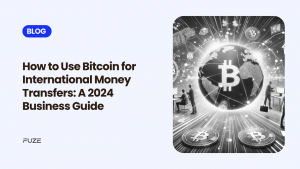In today’s globalized world, cross-border transactions have become a vital component of business operations and personal finance. For businesses in the Middle East, with its vibrant trade activities and diverse expatriate population, understanding cross-border payments is crucial.
This guide will explore the nuances of cross-border payments, the existing options and challenges involved, and how Fuze’s B2B cross-border payment solution using blockchain and stablecoins can address these challenges.
What are cross-border payments?
Cross-border payments refer to transactions where the payer and the recipient are located in different countries. These transactions can be for goods, services, or financial assets and are essential for international trade, remittances, and investment activities. Cross-border payments can involve various currencies and financial intermediaries, making them more complex than domestic transactions.
Now, it would be easy to ask that if cross-border transactions are so complex, then why would one use them? There are several instances in which cross-border transactions can come in handy. Here are a few of them:
- Importing and exporting goods and services: Companies need to pay for supplies from abroad and receive payments for goods and services they sell internationally.
- Investing in overseas ventures: Businesses may invest in subsidiaries or projects in other countries, which requires sending funds abroad.
- Hiring international talent: Companies can hire employees or contractors from anywhere in the world and need a way to pay them.
Navigating cross-border payments in the Middle East
Businesses and individuals in the Middle East have a growing toolbox for making international payments. Here’s a breakdown of the common options, highlighting their strengths and considerations:
- Wire transfers: A traditional and secure method offered by most banks. However, they can be slow, with processing times taking several days. Additionally, high fees and unfavorable exchange rates can eat into your transfer amount.
- Foreign Exchange Brokers (FX Brokers): Ideal for businesses sending larger sums. FX brokers often provide more competitive exchange rates and lower fees compared to banks. This makes them a cost-effective option, especially for frequent international transactions.
- Bank-facilitated international transfers: Many banks offer dedicated international money transfer services. While convenient for existing account holders, these services can still incur high fees and have less favorable exchange rates than FX brokers.
- Money Transfer Operators (MTOs): MTOs like Western Union and MoneyGram are known for their fast and reliable service, making them a good choice for smaller, urgent transfers. Their wide network of agents ensures easy access, but for larger transfers, the fees can become significant.
The best option among these would depend on your or your businesses’ specific needs. When choosing a transfer method, consider factors like:
1. Transaction size
For bulk payments or high-value transfers, prioritize Foreign Exchange (FX) Brokers. They typically offer more competitive exchange rates and lower fees compared to banks, leading to substantial cost savings on large transactions.
2. Speed requirements
If time is of the essence, Money Transfer Operators (MTOs) like Western Union or MoneyGram are your best bet. Their established network allows for fast and reliable international transfers, ideal for urgent payments or time-sensitive purchases.
3. Integration and convenience
Bank-facilitated international transfers provide a familiar and convenient option, especially for businesses already established with a particular bank. However, explore potential fees and exchange rates before relying solely on this method. Banks might not always offer the most competitive terms.
4. Cost optimization
Always compare fees and exchange rates across different providers. Consider hidden charges and negotiate where possible. FX brokers often provide greater flexibility for larger transactions.
Emerging solutions for streamlined cross-border payments
The traditional options we’ve discussed have served businesses well, but the Middle East is witnessing an exciting wave of innovation in cross-border payments. Here’s a closer look at two key initiatives transforming the landscape:
AFAQ Payment System
Launched in 2020, AFAQ stands for the Arab Financial Automated Clearing House. It’s a game-changer for businesses operating within the Gulf Cooperation Council (GCC) countries (Bahrain, Kuwait, Oman, Qatar, Saudi Arabia, and the United Arab Emirates). AFAQ functions by linking the real-time gross settlement (RTGS) systems of all GCC central banks. This translates to:
- Faster transactions: Payments are settled instantly or within seconds, significantly reducing processing times compared to traditional wire transfers.
- Enhanced transparency: AFAQ provides real-time tracking of payments, offering greater visibility and control for businesses.
- Reduced costs: By streamlining the process and eliminating intermediary banks, AFAQ has the potential to lower overall transaction fees for businesses within the GCC.
Buna Platform
Established by the Arab Monetary Fund, Buna is a multi-currency payment platform specifically designed to facilitate cross-border transactions between Arab region countries. It offers several advantages for businesses:
- Multi currency support: Buna allows payments in various Arab region currencies, eliminating the need for foreign exchange conversions for certain transactions. This can simplify the process and potentially reduce conversion fees.
- Wider reach: Beyond the GCC, Buna connects businesses across the broader Arab world, facilitating smoother regional trade and investment.
- Enhanced security: Buna leverages robust security protocols to ensure the safety and integrity of cross-border transactions.
While both AFAQ and Buna are relatively new initiatives, they hold immense promise for the future of cross-border payments in the Middle East. Rest assured, we will keep you updated about their development and how these platforms can optimize international financial operations for businesses in the Middle East region!
Challenges of cross-border payments in the Middle East
While cross-border payments are crucial for businesses operating in the Middle East, several hurdles can hinder their efficiency and effectiveness. Let’s understand.
1: High costs
Traditional methods for sending money internationally can be burdened by hefty fees. These include upfront transfer charges levied by banks or money transfer operators (MTOs), intermediary bank fees incurred during the transfer process, and unfavorable exchange rates that eat into the final amount received. The cumulative effect of these costs can significantly impact a business’s bottom line, especially for frequent international transactions.
2: Slow processing times
The time it takes to complete a cross-border payment can be a major pain point. Traditional wire transfers can take several business days to settle, hindering cash flow and operational efficiency. This delay can be particularly problematic for businesses that rely on swift access to funds to complete time-sensitive transactions.
3. Complex regulatory landscape
Navigating the ever-evolving web of regulations governing cross-border payments in different countries can be a complex and time-consuming task. Businesses must comply with varying anti-money laundering (AML) and Know Your Customer (KYC) requirements, as well as currency controls that may exist in certain jurisdictions. This regulatory burden can add significant administrative work and potentially delay transactions.
4. Transparency issues
The lack of transparency surrounding fees and exchange rates associated with cross-border payments can be a major frustration for businesses. Hidden charges or unclear pricing structures can make it difficult to accurately predict the final cost of a transfer, leading to unexpected expenses and hindering financial planning.
5. Money transfer restrictions in the UAE
While the UAE is a major financial hub, its regulations regarding international money transfers can pose additional challenges for businesses. Strict rules and compliance requirements may add another layer of complexity to the cross-border payment process, potentially causing delays or requiring additional documentation. Businesses operating in the UAE should stay updated on the latest regulations and explore alternative solutions that comply with local requirements while optimizing efficiency and cost.
Fuze’s B2B cross-border payment solution using Blockchain and stablecoins
Fuze Finance steps up to the challenge of streamlining cross-border payments in the Middle East by leveraging the power of blockchain technology and stablecoins. Our solution tackles several pain points, and transaction fees and exchange rate margins are significantly reduced by minimizing intermediaries thanks to the blockchain.
Businesses can ditch the waiting game as blockchain enables near-instantaneous settlement, speeding up the entire process. Fuze’s platform prioritizes regulatory compliance, making it easier for businesses to navigate the complexities of international regulations. Transparency is key in business transactions and stablecoins ensure predictable transfer value, while blockchain provides a transparent record of all transactions, minimizing hidden costs and fostering trust.
Furthermore, Fuze’s solution is specifically designed to navigate the UAE’s regulatory landscape, ensuring smooth and compliant cross-border transactions for businesses operating within the region.
Fuze Finance’s B2B cross-border payment solution is ideal for various high-volume transaction scenarios such, but not limited to, the following:
- Real estate developers/buyers: Facilitating large payments for international property transactions.
- Businesses paying in bulk: Companies paying overseas suppliers or partners in large amounts.
- Oil purchases: Enabling oil companies to pay for international fuel purchases efficiently.
- Airline companies: Handling payments for fuel and other operational expenses abroad.
- Supermarket chains: Managing bulk payments to international suppliers.
- Luxury goods purchases: Facilitating high-value transactions for items like luxury cars and jewellery.
Conclusion
Cross-border payments are an integral part of global commerce, particularly in the Middle East. While traditional methods come with several challenges, Fuze Finance’s blockchain and stablecoin-based payment gateway offer a promising alternative. By reducing costs, speeding up transactions, and ensuring compliance, Fuze Finance helps businesses and individuals navigate the complexities of cross-border transactions with greater ease and efficiency.
To learn more about how Fuze can help you with your payment needs, write to us. Or get started with your first payment here!







